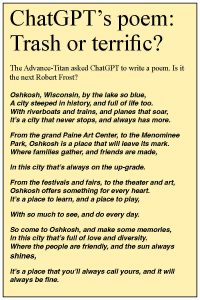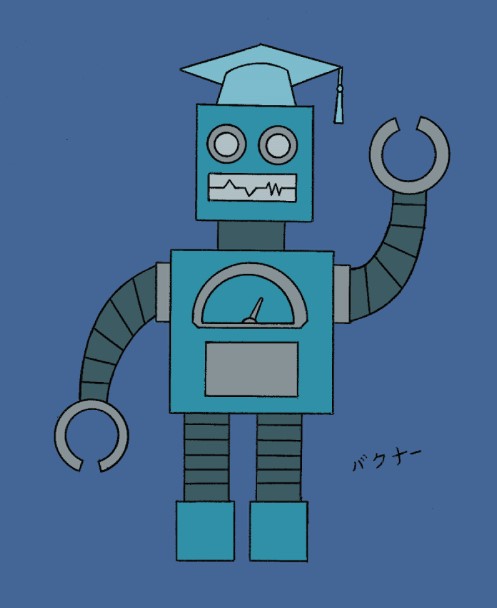AI generates controversy in classroom
February 8, 2023
AI’s recent developments and increased accessibility could present new challenges in classroom settings, but also act as a new type of aid, UW Oshkosh professors say.
At the forefront of AI technology, chatbot ChatGPT has been steadily gaining popularity since its initial launch in November 2022.
More recently, the bot set the record for the fastest-growing user base, thanks to its ability to write essays, code and even poetry.
Since ChatGPT’s release, public school districts from New York City to Seattle have banned or limited the use of the bot due to concerns of academic honesty.
However, universities like UWO have been slower to follow suit, raising questions about how AI-generated content fits into a college classroom.
Computer Science Department Chair George Thomas said he is encouraging his students to familiarize themselves with ChatGPT to better understand its capabilities.
“I asked all my students to try ChatGPT just so that they are aware of what current technology is capable of and to know that it is improving at a very rapid rate,” Thomas said.
Thomas said the AI chatbots have limitations to the quality of its answers and particularly struggle to discern between fact and misinformation. However, they can solve smaller, more straightforward problems with ease.
As the technology improves, students have more opportunities to turn in AI-generated content as their own, in turn raising concerns of academic integrity.
“ChatGPT is a challenge because most standard plagiarism detectors such as Turnitin are ineffective in this case,” Thomas said. “There is software that claims to detect AI-generated content but I think that next year, as ChatGPT gets better, that software won’t spot more and more instances of such AI-generated content.”
Thomas said he urges students to refrain from turning in AI-generated content as their own.
“Our expectation is that students will submit their own work, which means not using the internet (which includes ChatGPT) for any work that is expected to be their own,” Thomas said.
To combat AI-related plagiarism, the computer science department has placed more weight on in-class work, Thomas said.
“The short-term solution for many departments such as ours has been to put more weight on proctored assessments such as exams and in-class quizzes,” Thomas said.
“This is not always the best way to assess students,” he added.
Although the influx of AI-generated content raises concerns of students turning in work they didn’t create, it has potential as a useful tool when it comes to learning, UWO English professor Loren Snyder said.
Writers have already seen the benefits of using AI while writing with the rise of sites like Grammarly, which was launched in 2009, that review already-written work for errors.
Snyder referred to Bloom ’s Taxonomy, a model illustrating the hierarchy of educational learning in six stages: remembering, understanding, applying, analyzing, evaluating and creating.
’s Taxonomy, a model illustrating the hierarchy of educational learning in six stages: remembering, understanding, applying, analyzing, evaluating and creating.
He said ChatGPT can aid students in the creation process in the same way internet browsers have reduced the need to recall readily accessible information — a helpful service in the classroom.
“I think it can absolutely be helpful,” he said. “Google, for example, has taken away the necessity of remembering in Bloom’s Taxonomy. [ChatGPT] takes the creation away.”
Snyder noted that while some parts of learning may change, the most important part of education remains: thinking.
“I think the essential parts of a college education are contained in the middle of Bloom’s Taxonomy, and that is the capacity to think,” he said. “The capacity to create is also a vital skill, but fundamentally, it’s about thought.”














